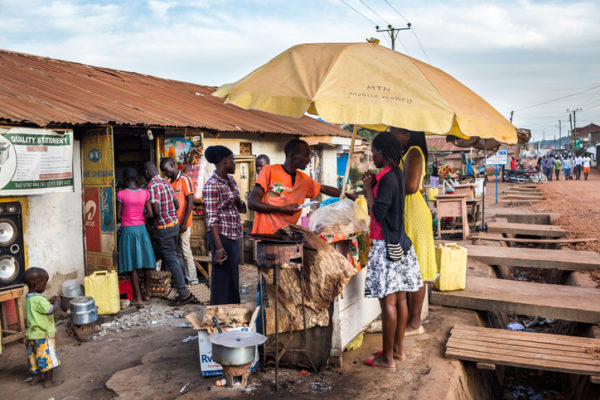Co-identifying and co-analysis of energy briquettes capacity gaps and needs in Kampala
This blog, authored by Judith Mbabazi and Teddy Kisembo, describes the work of the Knowledge in Action for Urban Equality (KNOW) project in Kampala, Uganda. This is part of its collaborative work with local organisations in cities across Africa, Asia and Latin America. This was reposted from the KNOW website.

The KNOW Kampala City Project is adopting an “opportunities creation approach”, examining alternative means of managing organic wastes with local community groups and stakeholders.
If well utilised, non-standard means for approaching waste can provide alternative livelihood strategies for the urban poor, especially women.
In Kampala, an alternative means for managing organic waste has been found in the production of ‘energy briquettes’, helping the urban poor mobilise local community groups and integrate them into the urban economy.
Kampala, according to Kampala Capital City Authority (KCCA) records, generates an estimated 1,200-1,500 tons of garbage on a daily basis, 40% of which is collected and 60% uncollected. The most uncollected garbage is found in informal settlements, where low income earners live. This results into the indiscriminate disposal of wastes, not only degrading the environment, but also making livability in these settlements and the city at large, very challenging. Of the generated garbage, organic waste accounts for an estimated 73.8%. However, organic waste is a resource that if fully utilised can provide opportunities to improve livelihoods and incomes through energy production.
The projects long term goal is to contribute towards:
a) scaling out and scaling up business enterprises that could benefit the urban poor to reduce inequality,
b) reduce indirect costs on the community associated with poor waste management practices and improve the neighbourhood environment. In turn this can help to integrate informal settlements into the urban economy
c) reduce operation costs for KCCA in managing the waste sector and pave the way for institutionalisation of opportunities as a strategy of urban development.
On the 31st of January 2019, the Urban Action Lab at Makerere University, carried out a stakeholder analysis meeting with the communities of Kasubi Parish local Community Development Initiative (KALOCODE),Lubaga Charcoal Briquette Cooperative Society Limited (LUCHACOS) and ACTogether federation members from Makindye and Kawempe Divisions of Kampala.
Organic waste transformation into reusable products has remained at micro scale in communities over the years. In light of this understanding, the workshop was run with the objective of bringing together all briquette making groups and those interested in starting such networks. The workshop sought to establish interest in energy briquettes, whilst allowing for sharing experiences amongst members currently manufacturing briquettes, identifying their capacity needs and gaps.
To gain a better understanding of the dire waste management situation in Kampala, Mrs Martha Mugarura, principal urban planner at the Ministry of Lands, Housing and Urban Development; had members reflect on the situation in their individual neighbourhoods. These discussions acknowledged the fact that poor waste management practices can be found in all neighbourhoods in the same, or even worse, conditions. It is likely that this is not just in Kampala, but in all urban centers in the country; in terms of garbage generated, collected, and means of disposal. It raises the question as to how much change could be realised if more garbage was to be turned into energy briquettes, or other reusable products. Discussing the reasons as to why the current scale of energy briquette production is still relatively low, Mrs Mugarura stressed;
“We cannot influence anybody else to start producing or using energy briquettes until we fully understand their role and potential impact on our livelihoods.”
This was followed by members sharing their experiences around the production and usage of briquettes and their associated benefits. This included trying to mitigate waste clogging local drainage channels and being able to save on income that would otherwise be spent on the purchase of wood charcoal. Participants discussed that whilst sales of briquettes was the major reasons for beginning production, other benefits included; introduction to saving schemes improving household incomes, burning efficiency, lower greenhouse emissions, and savings due to briquettes being much cheaper than wood, charcoal and/or electricity. For those currently engaged in briquette manufacture, the production also provides employment (especially to stay home mothers), results in a cleaner environment reducing health risks, and assists in empowering woman in the formation of network platforms.
A number of capacity gaps and needs were identified during the meeting including:
a) raising awareness around the potentials of waste in order to affect changes in attitudes,
b) training around the entire ‘value chain’ of energy briquettes,
c) small business planning, including the development of business plans, stocks and numbers, costing and general financial efficiency,
d) types of ingredients for production, and how to sort them
e) technical capacities, in terms of technology needed in the production, drying, and sorting.
The KNOW Kampala city team will continue to work closely with the numerous local stakeholders to foster the ‘opportunities creation approach’; empowering local networks (especially women’s groups), sharing knowledge, and continuing to analyse and research the benefits of producing and alternative waste products at a neighbourhood level.